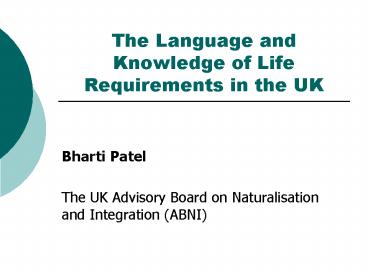The Language and Knowledge of Life Requirements in the UK
1 / 14
Title: The Language and Knowledge of Life Requirements in the UK
1
The Language and Knowledge of Life Requirements
in the UK
- Bharti Patel
- The UK Advisory Board on Naturalisation and
Integration (ABNI)
2
ABNI - An independent advisory body established
by the Government in November 2004
- To advise on
- The implementation of the requirement to show an
understanding of English and Life in the UK
(Nationality, Immigration and Asylum Act 2002) - English and a Knowledge of Life in the UK are
requirements for British Citizenship or permanent
residence in the UK
3
Naturalisation statistics 2007
- 164,635 grants of Citizenship(10,540 on previous
year) - 53 on the basis of residence
- 18 on the basis of marriage
- 25 of minor children
- Main nationalities
- India 9
- Philippines 7
- Afghanistan 6
- South Africa 5
- Pakistan 5
- (figures for 2007)
- 2,365 cases refused for insufficient English and
KOL
4
Settlement Statistics 2006
- 134,430 Grants of Settlement in 2006
- Family union 66
- Work related purposes 12
- Asylum related reasons 14
- Discretionary basis 5
- Other 3
5
Background to English and Knowledge of Life in
the UK
- Introduced by then Home Secretary, Rt Hon David
Blunkett MP - To make the process of gaining British citizen
meaningful and celebratory and - Increase integration i.e. participation in public
life - (previous requirement for a Knowledge of English,
but rarely enforced)
6
The Nationality, Immigration and Asylum Act 2002
Requirements
- To show an understanding of English (or Scottish,
Welsh or Gaelic) - To show a knowledge of life in the UK
- For new British citizens-to take an citizenship
oath and pledge of allegiance at a citizenship
ceremony
7
Assessment Two Routes
- For those with good English
- An on-line test based on a prescribed text Life
in the UK Handbook - For those with lower English Language Skills
- An English Language Course (ESOL) with
Citizenship ( and show progress by one level at
Entry Level)
8
The Life in the UK Test
- Majority of applicants (80-95 take this route
- Over 100 Test Centres around the UK
- Fee for each attempt is 34
- Test consists of 24 online questions all multiple
or binary choice, pass mark is 75 - No limit to the number of times the test can be
taken - Website www.lifeintheuktest.gov.uk
9
The Life in the UK Handbook
- The Making of the United Kingdom
- A Changing Society
- A profile of the UK today
- How the United Kingdom is Governed
- Everyday Needs
- Employment
- Knowing the Law
- Sources of Information
- Building Better Communities
10
Sample Questions
- What does an MP do? How often are elections held?
Who forms the government? - How would you find a dentist? Which groups of
people receive free dental treatment? - How would a person get a driving licence? How
long can overseas driving licences be used for in
the UK?
11
The Life in the UK Test- Issues
- 572,789 people have taken the test as at April
2008 - By April 2008, 41 of the tests were for
settlement - The current pass-rate is 73.9
- Lower pass rates for some nationalities e.g.
- Afghanistan47.2
- Bangladesh 47.7
- Turkey 45
- Factors behind failure could include
- Insufficient levels of English and levels of
previous education. - Failure to study the official handbook
- A belief that residual knowledge from residence
in the UK is sufficient - ABNI recommendation 2007 Annual Report that these
arrangements are evaluated not least to discover
if the arrangements are contributing to the
policy objectives
12
ESOL Route
- Generally one year to make the necessary progress
- Rate of progress is affected by level of previous
education, access to high quality learning and
opportunity for interaction - ESOL classes an excellent opportunity for
interaction with other groups - More scope for facilitation of active citizenship
within classes - Long waiting lists for classes in some areas
- Difficulty for those who work long hours to
attend classes - Evidence that some people will attempt the test
rather than embarking on an ESOL course
13
Future Developments
- Recommendations from Lord Goldsmiths independent
review of citizenship - That the test and Handbook should encompass a
local element - That the Life in the UK Test is revised so that
it supports real learning (not rote learning)
14
Future Developments
- Current Government consultations
- Home Office proposals to speed up the acquisition
of citizenship through earning credits from
volunteering and other active citizenship.
Introduction of probationary citizenship. - DIUS proposals to target ESOL resources on areas
with community cohesion issues or within a
national framework of priority groups e.g. legal
residents, excluded women, those without a
secondary education or literacy in their own
language, refugees.































